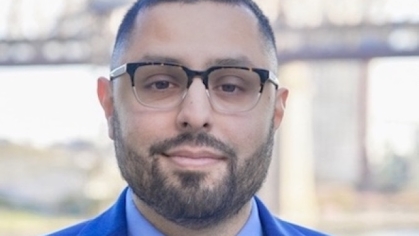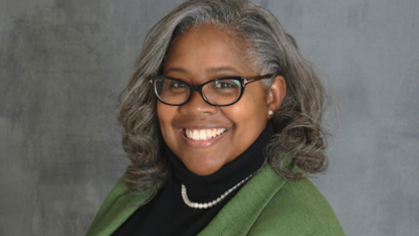October is Domestic Violence Awareness Month. Rupa M. Khetarpal, MA, MSW, LCSW, Associate Professor of Teaching and Director of the Certificate on Interpersonal Violence and Trauma (C-IVT), explains the importance of observing this month and how social workers and allied professionals can support survivors and their loved ones this month and beyond.
Tell us a bit about your journey to social work.
Power imbalances and the resulting oppression has always intrigued and outraged me, first in India and then globally as I traveled. I spent nine years as a television journalist capturing stories and voices that discussed oppressive social norms that are harmful for women, children, and people from marginalized communities. I wanted to engage more actively in understanding violence perpetuation and prevention and ventured into social work while volunteering at a domestic violence shelter in Canada. I realized that I had found my professional space and if I were to be an effective changemaker I needed to enroll in a social work program. I went back to get my second master’s degree in social work at Rutgers School of Social Work. Currently, as a Ph.D. candidate and a faculty member, I have continued to strive towards building knowledge, providing culturally responsive, trauma-informed clinical services, and educating the next generation of social workers with the hope of eliminating violence and creating safe spaces for all.
What is the significance of Domestic Violence Awareness Month for you?
Domestic Violence (DV) Awareness Month evolved from the “Day of Unity” in October 1981, which was conceived by the National Coalition Against Domestic Violence. October became the month chosen to bring awareness to the social epidemic of domestic violence, a public health concern that continues to plague our nation and globally impact millions. During this awareness and prevention month, advocates across the nation unite to honor and support the voices of victims and survivors, and express gratitude to the first responders, service providers, individuals, and organizations that work tirelessly to prevent domestic violence and keep individuals, families, and communities safe. Interestingly, as a South Asian Hindu, my family and I celebrate Durga Puja, or the celebration of goddess “Shakti” or “Ma Durga,” in the month of October. Goddess Durga symbolizes transformative positive energy, love, wisdom, knowledge, and the emergence of inner strength in the face of adversity. It is particularly meaningful to me that we celebrate Mother Durga as the symbol of feminine power/courage and perseverance in the month where many are surviving violence, protecting their loved ones, and/or preventing acts of violence.
How can the social work community recognize and commemorate DV Awareness Month?
Domestic violence is more than a gender, public health or a social issue. It violates an individual’s basic human rights, a person’s right to basic safety, and the right to self-actualize and self-determine without fear. The social work community can commemorate this month in many ways, including hosting and engaging in awareness events and learning about domestic violence so we can responsibly educate and inform others. These activities can range from hosting a movie night with our families and friends that generates a discussion on domestic violence and its impact, to participating in advocacy and activism through awareness walks, public speaking events, and lobbying for legislation change. Some of these events include “16 Days of Activism against Gender-Based Violence,” #Every1KnowsSome1 campaign (NNEDV), candle light vigils and Violence Prevention and Victim Assistance’s (VPVA, Rutgers) Turn The Campus Purple, wearing purple to show support of domestic violence survivors and commitment to ending abuse. You may also donate to local and/or global organizations engaged in preventing domestic violence and protecting survivors and victims. Please refer to a list of organizations included in the resources section and events being hosted locally and nationally.
What can the social work profession or social workers do to continue to support individuals impacted by DV beyond this month?
Social workers can contribute in multiple ways this month and onwards to educate and create awareness, reduce victim/survivors’ shame, and hold perpetrators accountable. As individuals, we can begin at home, educating our communities to recognize the prevalence and harm related to domestic violence, educate our children about respect and healthy relationships, and address and voice our concerns when we see power-based oppression around us. We can all share the responsibility in creating violence-free spaces in our homes and in our communities and refrain from interpreting our cultural norms in ways that create oppressive structures for those marginalized due to their intersectional identities. As trained social workers, we possess the knowledge, values, and skills to influence the systems within which we operate—healthcare, law enforcement, education/schools, and the criminal justice system—to achieve effective outcomes. We can work collaboratively and inter-professionally towards prevention and intervention. Finally, we can strive to lobby for policy and legislation changes, promote improved resource access for all communities, petition for equity in housing and wages for survivors, and funding to improve healthcare and law enforcement response for survivors and families.
Resources
New Jersey Coalition to End Domestic Violence (NJCEDV), www.njcedv.org
National Resources Center on Domestic Violence, www.nrcdv.org
National Coalition Against Domestic Violence, www.ncadv.org
National Network to End Domestic Violence, www.nnedv.org
National Center on Domestic Violence, www.ncdvtmh.org
Office on Violence Against Women, https://www.justice.gov/ovw/domestic-violence
This story was created in partnership with Rutgers School of Social Work's Inclusion, Intersectionality, Diversity, Equity, and Advancement (IIDEA) Committee.



